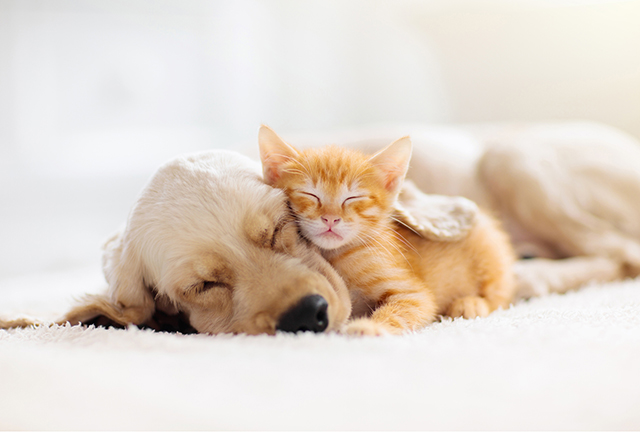COVID-19 has introduced many changes to our routines and taken a significant toll on people’s physical and mental health. Unfortunately, our pets are not immune to these stressors. If you’re wondering how to keep your pets safe from the virus and protect their mental health, much information is available, which I have summarized here.
Pets and the COVID-19 Virus
Are you wondering how to keep your pet safe during the pandemic? The rules are pretty similar to those keeping humans safe.
Physical distancing also applies to our pets — keep your cats indoors and try to make sure your dogs are at least 6 feet away from others during walks. There is no need to try and fashion pet face masks; these can actually do more harm than good. Additionally, do not attempt to bathe your pet with chemical disinfectants, alcohol or hydrogen peroxide. Their usual pet shampoo will get the job done.
If You Have COVID-19
It is possible to transmit COVID-19 to your pet, although the risk of transmission is believed to be low according to the Centers for Disease Control and Prevention (CDC). You should avoid contact with your pets as much as possible if you are infected with COVID-19. If there is someone else in the household who can care for your pet, have them do so. If you are your pet’s sole caretaker, try to avoid excessive contact — that means no petting, snuggling, kissing, allowing yourself to be licked, sleeping in the same bed, etc. — and don a mask when interacting with your pet for feeding, walks and other necessary activities. Make sure to wash your hands before and after interacting with your furry friend.
Remember, you can transmit COVID-19 to your pet if you’re infected. Animals such as cats, dogs and mink have acquired the virus, mostly after interaction with infected humans.
If You Suspect Your Pet Has COVID-19
Do NOT immediately rush your pet to the vet. Call your vet first and let them know that you have or have had COVID-19 and suspect it has spread to your pet. Your vet likely will give you a modified visit to prevent spreading the virus to other pets or see your pet through a telemedicine consultation.
Given that not much is known about how COVID-19 infects pets, make sure to stay updated by checking out the CDC website.
Pet Mental Health During COVID-19
Many of us are aware that our pets benefit our mental health greatly, but we don’t often hear about dogs’ or cats’ own mental health. Just like humans, pets may also be having a hard time adapting to lifestyle changes during COVID-19.
Signs of Mental Distress
- Changes in eating habits
- Vomiting
- Urinating or defecating in inappropriate places
- Changes in sleeping habits
- Inactivity
- Pacing
- Becoming withdrawn or hiding
- Aggression
- Increased clinginess
- Increased barking, howling, meowing or whining
- Hypervigilance
- Panting (cats)
- Excessive grooming (cats)
- Not participating in activities they once enjoyed
How to Help
Your pet’s change in behavior may be extremely undesirable, but remember that punishing your pet will only make the problem worse. If your pet is showing concerning symptoms or is just not acting like his or her normal self, make sure to call your vet right away. Your vet will likely do a workup to rule out medical causes for the changes in behavior. Once the cause is determined to be related to your pet’s mental health, your vet will likely recommend changes to your home environment to make it less stressful to your pet. Your vet may also recommend changes in your or your pet’s routine, calming pet pheromone products, and antidepressant or anti-anxiety medications.
Adopting During COVID-19
Are you missing a furry companion in your life? With many shelters around the country having closed months ago, there are animals in need of homes now more than ever! Currently, shelters around the county are operating by appointment only.
Baltimore Area Animal Shelters
Note: Please remember that although many pets are currently in need of homes, you should only adopt if you have the time and resources to care for your pet, both during COVID-19 and after it has ended.
Related content
- Ways in Which We Can Help Throughout the Coronavirus Pandemic
- Graduate School Is the Cat’s Meow
- Are llamas the Key to Curing the Flu?
Want to read more from the Johns Hopkins School of Medicine? Subscribe to the Biomedical Odyssey blog and receive new posts directly in your inbox.
